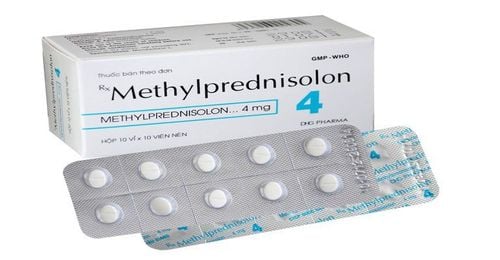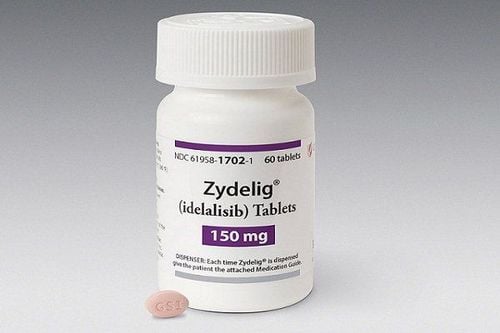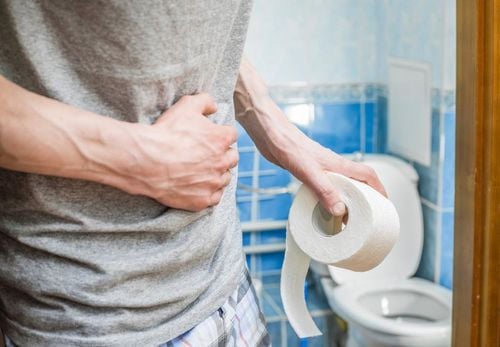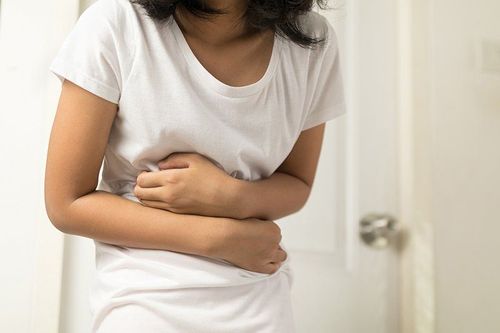This is an automatically translated article.
Posted by Master, Doctor Mai Vien Phuong - Gastrointestinal Endoscopy - Department of Medical Examination & Internal Medicine - Vinmec Central Park International General Hospital
The condition of having green stools has many different causes, sometimes just from eating habits, however, it does not rule out signs of serious diseases of the digestive tract. So what are the common causes of green stools?
There are many patients who come to the clinic because of green stools. "Why is my poop green?" However, look at your diet, you will most likely find the answer. But there are several other causes of abnormal stool color as well:
An underlying medical condition Antibiotics A recent medical procedure Bacterial infection
1. Why is stool usually brown or yellow?
The usual color or yellow-brown of stool is caused by a leftover mixture of dead red blood cells and waste from bacteria in the gut. Bile in the intestines is usually greenish-yellow, but bacteria will add the rest of the color. Besides making your stools brown or yellow, bacteria also perform extremely important functions such as helping you absorb nutrients from your meals.
Stool can be a different color when food doesn't spend enough time in your digestive tract. This can happen if you have diarrhea. In that case, the substances in your intestines run too fast to facilitate the bacteria that produce the characteristic color of stool.
The most common reason for green stools is a habit or a change in diet. Foods that can cause green stools include:
Kale Spinach Broccoli Blueberries
Dark green vegetables and green powder supplements contain a lot of chlorophyll, the chemical that allows plants to make energy from the sun. This can turn yellow or brown stools into green stools.
Certain food colorings that are not processed properly can also leave a colorful residue in the stool. So, if you wake up after a night of binge drinking and notice something strange when you go to the bathroom, you may just need some water.
The color of the food you consume doesn't have to be green to cause green stools, but purple, blue and black colors can also lead to green stools. For example, in 2015, the fast-food chain Burger King went viral with posts from individuals who bought their "Halloween Whopper," featuring a rye bread. Many Halloween Whopper participants reported that their poop turned green after eating.
2. Bile pigment is also the cause of green stools
Bile is a liquid made in the liver and stored in the gallbladder. This liquid is naturally yellow-green in color. When bile combines with the food you eat, it helps increase the efficiency of pancreatic lipase so that the body can break down more fat from the diet. This allows more fat to be absorbed into your body in the small intestine.
However, the body must break down bile so that it can be excreted as waste. Usually, this is done by taking a route through the intestines. Sometimes when you have diarrhea or stomach cramps, the bile can't be broken down as quickly. The result may be greenish-colored stools.
3. Antibiotics and other drugs are also to blame
If you have recently been prescribed a course of antibiotics, especially strong ones for severe infections, they can kill most of the normal bacteria in the gut. This reduces the number of brown-staining bacteria in the lower intestine. Probiotics, such as yogurt or kombucha, can help restore balance to your gut flora.
Certain other medications and supplements can also cause a breakdown of the pigments that make your stools green. Examples of these include:
indomethacin (Tivorbex) a nonsteroidal anti-inflammatory drug used for pain relief Iron supplement Medroxyprogesterone (Depo-Provera), a medication used to prevent pregnancy
4. Caused by medical procedure
Stool discoloration can also occur after a major medical procedure, like a bone marrow transplant. If your body rejects the transplant, a condition known as graft-versus-host disease can develop and cause serious gastrointestinal (GI) disturbances, which can lead to diarrhea and green stools.
5. Parasites, viruses and bacteria
Parasitic, viral and bacterial invaders can also cause green stools. Yes, your body already contains billions of bacteria that serve an important purpose. Bacteria like Salmonella (a common culprit in most food poisoning cases), giardia parasites, and norovirus in water can cause your intestines to flush red faster than usual and lead to green stools.
6. Digestive Status
If you have Crohn's disease or an upset stomach, bile can move through your intestines too quickly, causing green stools. Crohn's disease is an intestinal disease that causes inflammation in the digestive tract.
Celiac disease is a gluten intolerance that causes many gastrointestinal problems, such as bloating, gas, diarrhea, and stomach pain. If you have diarrhea or loose stools with celiac disease, you may also have green stools.
Other possible causes of green stools include: irritable bowel syndrome, ulcerative colitis and laxative abuse.
7. Anal fistula
Anal fistulas are small tears in the tissue lining the anus, usually the result of passing hard stools. So if you have anal fissures related to diarrhea, you may notice green stools. The fissures can also cause bright red blood in your stool.
8. Is green poop a sign of cancer?
Don't panic or imagine the worst if you pass green poop. It is true that stool of different colors can be a sign of a cancerous tumor. But with cancer, stools are often black or tarry. This usually indicates bleeding from somewhere in the upper digestive tract. Also, sometimes bright red blood occurs in cancers of the lower gastrointestinal tract.
While green stools are not usually a cause for concern or a sign of cancer, green stools with other symptoms should not be ignored. If you see green stools without any other symptoms, the culprit could be leafy greens or food coloring.
If you have other symptoms, such as recurrent diarrhea or vomiting that do not improve, this may indicate a medical condition such as Crohn's disease or irritable bowel syndrome.
9. When to see a doctor when passing green stools?
If you have diarrhea for more than three days, it's time to call your doctor and seek medical attention. Prolonged, untreated diarrhea can lead to dehydration and poor nutritional status.
If chronic green stools are accompanied by more serious symptoms, such as abdominal pain, blood in the stool or nausea, these symptoms should also be seen by a doctor.
While the nature of the exam can be a bit difficult to discuss, your doctor can review your list of medications, diet, and other medical conditions to determine potential causes of chronic green stools. count. If you've had green stools just once, it's most likely not a cause for concern.
However, seeing other colors in the stool may indicate a problem. Bright red indicates the possibility of bleeding in the lower intestine. Black or dark brown like tarry may indicate bleeding in the upper gastrointestinal tract. But remember, it could also be the blueberries or black licorice you ate for lunch.
If you've been diagnosed with a medical condition, preventing green poop starts with addressing the underlying problem. For example, avoid foods like gluten that cause diarrhea if you have celiac disease. Also, limit foods that worsen irritable bowel syndrome and Crohn's disease symptoms, such as caffeine, dairy, fatty foods, and carbonated beverages. Keep a food diary to help identify triggers.
The color of stools will partly reflect the current health status if the condition of green or bloody stools occurs with a frequency of many times, it is best to go to a reputable medical facility to be checked. check.
Currently, Vinmec International General Hospital is a reliable address in diagnosing digestive diseases, chronic diarrhea, Crohn's disease... Along with that, the hospital also implements techniques Screening for gastric cancer, gastric polyps through gastric endoscopy with Olympus CV 190 endoscope, NBI (Narrow Banding Imaging - endoscope with narrow light frequency band) for pathological analysis image results The mucosa is clearer than conventional endoscopy to detect ulcerative colitis lesions, early stage digestive cancer for the best treatment direction.
Please dial HOTLINE for more information or register for an appointment HERE. Download MyVinmec app to make appointments faster and to manage your bookings easily.
ReferenceBowel movement. (n.d.) nlm.nih.gov/medlineplus/bowelmovement.html Carter, A. (2015, October 8). Why the black Whopper turns your poop green. USA Today. Retrieved from usatoday.com/story/news/nation-now/2015/10/08/why-black-whopper-turns-your-poop-green/73623596/ GVHD signs and symptoms bethematch.org/For-Patients-and- Families/Life-after-transplant/Graft-versus-host-disease/GVHD-signs-and-symptoms/ Giardias - general information. (2015, July 21) cdc.gov/parasites/giardia/general-info.html Mayo Clinic Staff. (2015, December 30). Anal fissures: Symptoms and causes mayoclinic.org/diseases-conditions/anal-fissure/symptoms-causes/dxc-20168232 Mayo Clinic Staff. (2015, September 19). Green stool: Definition mayoclinic.org/symptoms/green-stool/basics/definition/sym-20050708 Picco, M. F, (2016, October 6). Stool color: When to worry mayoclinic.org/stool-color/expert-answers/faq-20058080 Travelers' diarrhea. (2013, April 26) wwwnc.cdc.gov/travel/page/travelers-diarrhea





